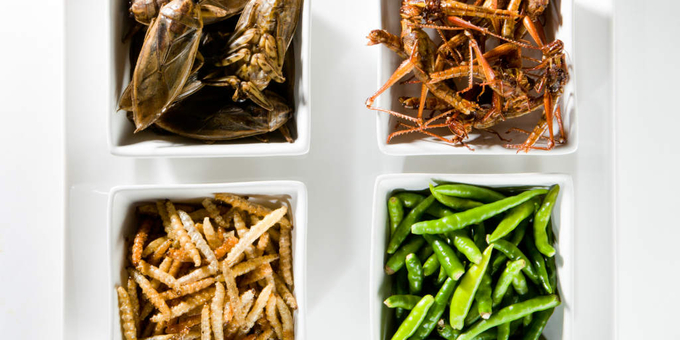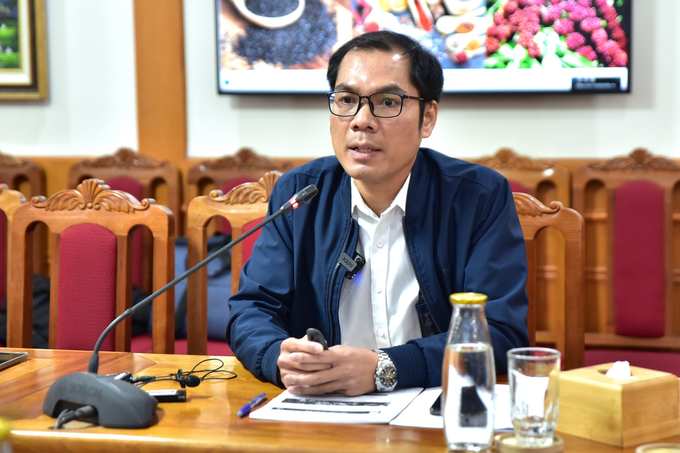May 23, 2025 | 03:38 GMT +7
May 23, 2025 | 03:38 GMT +7
Hotline: 0913.378.918
May 23, 2025 | 03:38 GMT +7
Hotline: 0913.378.918

EU Regulation defines "novel foods" any food that was not commonly consumed to a significant degree within the EU before 15 May 1997. Photo: Technogym.
According to Mr. Dao Van Cuong, a specialist from the Vietnam SPS Office, the European Union's Regulation (EU) 2015/2283, issued on November 25, 2015, defines "novel foods" any food that was not commonly consumed to a significant degree within the EU before 15 May 1997. In addition, the novel food needs to fall under one of the ten novel food categories stipulated by the very regulation. To be classified as novel food, the product must match at least one of the following eight categories:
(i) food with a new or intentionally modified molecular structure, where that structure was not used as, or in, a food within the Union before 15 May 1997;
(ii) food consisting of, isolated from or produced from microorganisms, fungi or algae;
(iii) food consisting of, isolated from or produced from material of mineral origin;
(iv) food consisting of, isolated from or produced from plants or their parts, except when the food has a history of safe food use within the Union and is consisting of, isolated from or produced from a plant or a variety of the same species obtained by traditional propagating practices which have been used for food production within the Union before 15 May 1997; or non-traditional propagating practices which have not been used for food production within the Union before 15 May 1997, where those practices do not give rise to significant changes in the composition or structure of the food affecting its nutritional value, metabolism or level of undesirable substances;
(v) food consisting of, isolated from or produced from animals or their parts, except for animals obtained by traditional breeding practices which have been used for food production within the Union before 15 May 1997 and the food from those animals has a history of safe food use within the Union;
(vi) food consisting of, isolated from or produced from cell culture or tissue culture derived from animals, plants, micro-organisms, fungi or algae;
(vii) food resulting from a production process not used for food production within the Union before 15 May 1997, which gives rise to significant changes in the composition or structure of a food, affecting its nutritional value, metabolism or level of undesirable substances;
(viii) food consisting of engineered nanomaterials; Food produced using nanotechnology.
Furthermore, Mr. Dao Van Cuong asserts that the term "novel food" covers "traditional foods from third countries" in accordance with Regulation (EU) 2015/2283. Countries outside of the European Union have historically consumed these foods.
Before being marketed in the EU, all novel foods must undergo a food safety assessment that proves they have been ingested safely for at least of 25 years.
Based on the available scientific evidence, the EU mandates that these categories of foods do not pose any safety risks to human health. Particularly when a novel food is intended to replace an existing food product and involves a substantial nutritional change, their intended use must not be misleading to consumers. Furthermore, a novel food that functions as a substitute for another food must not be nutritionally inferior to the original product.

Mr. Dao Van Cuong, a specialist from the Vietnam SPS Office. Photo: Tung Dinh.
The official Union List of Novel Foods is currently established by Regulation (EU) 2017/2470, which was issued on December 20, 2017, in accordance with Regulation (EU) 2015/2283 on novel foods.
Products that fall under the novel food category are among Vietnam's agricultural exports to the EU, including apple snail meat, fruit-flavored soft drinks containing basil seeds, and dried basil seeds.
Dao Van Cuong defines "food additives" as any substances that are not conventional food components and are not used as a primary component of food, as defined by Regulation (EU) 1333/2008, which was issued by the European Union on December 16, 2008.
A substance may become a direct or indirect component of the food, including any by-products that result from its use, if it is intentionally added to food for a technological purpose, such as manufacturing, processing, preservation, packaging, or transportation, regardless of whether it has nutritional value.
Food additives should only be employed when there are no other economic or technological alternatives that can achieve the same objective from a technological standpoint. Additionally, their utilization must not deceive consumers by presenting a false impression of the food's quality or nature.
Currently, Annex I of Regulation (EU) 1333/2008 establishes the list of approved food additives and their specific functions. This list includes: sweeteners, coloring agents, antioxidants, humidifiers, flavor enhancers, food flavorings, and acidity regulators.
Dao Van Cuong also observed that EU regulations are consistently revised and updated. In particular, the European Union has issued three warnings concerning novel foods since the inception of 2025.
The Vietnam SPS Office recommends that businesses remain informed about changes to EU regulations in order to facilitate agricultural exports and prevent product recalls or destruction.
“Businesses should submit an official inquiry to the Vietnam SPS Office for coordination with DG-SANTE (Directorate-General for Health and Food Safety) before exporting in order to receive specific guidance, as these regulations are highly complex and must be followed in a structured manner,” Cuong stressed.

(VAN) The mutual export of agrifood products between the European Union (EU) and the United Kingdom (UK) must occur again without certification, border controls or other red tape. This was agreed at the UK-EU summit.
/2025/05/22/5121-2-173645_677.jpg)
(VAN) NBSAP Tracker identifies strengths and areas for improvement in the National Biodiversity Strategy, based on each region’s priorities and capacities.

(VAN) The draft amendment to the Circular on rice export trading stipulates a periodic reporting regime for rice exporting enterprises.

(VAN) Dong Thap farmers attained an average profit margin of 64% during the summer-autumn 2024 crop (first season), while An Giang and Kien Giang farmers followed with 56% and 54%, respectively.

(VAN) As a doctoral student doing research on renewable energy and electrification at Harvard University, the author shares his musings on electricity, nature, and countryside memories.

(VAN) The decree on Extended Producer Responsibility (EPR) ensures transparent management and disbursement of support funds, avoiding the creation of a “give-and-take” mechanism.

(VAN) Hue City rigorously enforces regulations regarding marine fishing and resource exploitation, with a particular emphasis on the monitoring of fishing vessels to prevent illegal, unreported, and unregulated (IUU) fishing.